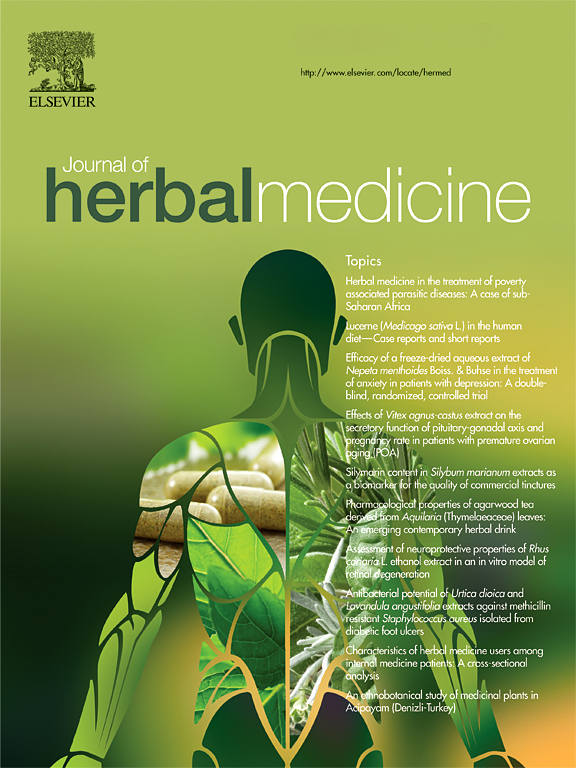Evaluating the Therapeutic Efficacy of Habb-e-Ghafis in Non-alcoholic Fatty Liver Disease, a Randomised, Single-Blind, Standard-Controlled Trial
IF 1.9
4区 医学
Q2 INTEGRATIVE & COMPLEMENTARY MEDICINE
引用次数: 0
Abstract
Introduction
Non-alcoholic fatty liver disease (NAFLD) is a prevalent metabolic disorder. Its emergence as a major health challenge has prompted a re-evaluation of therapeutic approaches, particularly considering the limitations associated with prevailing conventional treatments. It was hypothesized that Habb-e-Ghafis may exhibit therapeutic properties capable of ameliorating the pathological processes associated with NAFLD. The aim of the study was to evaluate the safety and efficacy of Habb-e-Ghafis in the treatment of non-alcoholic fatty liver disease.
Methods
This was a single-blind, randomised, standard-controlled clinical study. The study involved 44 non-alcoholic fatty liver disease patients, with 42 completing the trial. The study was approved by the Institutional Ethics Committee (IEC No.: RRIUMSGR/ MD-2019/CT/HG/NAFLD) on November 26, 2021, and registered with the Clinical Trials Registry-India (CTRI/2022/01/039497) on January 17, 2022. Patient recruitment commenced in March 2022 at RRIUM Hospital. The test group (22 patients) received Habb-e-Ghafis (3 pills, thrice daily) for 45 days, while the control group (22 patients) received Vitamin E (400 mg twice daily).
Results
Our study revealed the remarkable effectiveness of Habb-e-Ghafis in alleviating subjective symptoms. It significantly reduced liver span as quantified by Ultrasonography when compared to the standard medication. Concerning lipid profiles, the experimental drug notably reduced triglycerides and very low-density lipoprotein levels in comparison to the standard drug. Other lipid parameters showed similar effects in both treatment groups.
Conclusions
The results of this study suggest that Habb-e-Ghafis is more effective than the standard drug Vitamin E at reducing both subjective and objective parameters.

评价Habb-e-Ghafis治疗非酒精性脂肪肝的疗效,一项随机、单盲、标准对照试验
非酒精性脂肪性肝病(NAFLD)是一种常见的代谢紊乱。它作为一项重大健康挑战的出现促使人们重新评估治疗方法,特别是考虑到普遍的传统治疗方法的局限性。假设Habb-e-Ghafis可能表现出能够改善与NAFLD相关的病理过程的治疗特性。该研究的目的是评估Habb-e-Ghafis治疗非酒精性脂肪性肝病的安全性和有效性。方法本研究为单盲、随机、标准对照临床研究。这项研究涉及44名非酒精性脂肪肝患者,其中42人完成了试验。该研究已获机构伦理委员会(IEC No. 518)批准。: RRIUMSGR/ MD-2019/CT/HG/NAFLD)于2021年11月26日发布,并于2022年1月17日在印度临床试验注册中心(CTRI/2022/01/039497)注册。RRIUM医院于2022年3月开始招募患者。试验组(22例)服用Habb-e-Ghafis(3片,每日3次),连续45天,对照组(22例)服用维生素E (400 mg,每日2次)。结果Habb-e-Ghafis在缓解主观症状方面有显著效果。与标准药物相比,它显着减少了超声图像量化的肝跨度。关于脂质谱,与标准药物相比,实验药物显著降低了甘油三酯和极低密度脂蛋白水平。其他脂质参数在两个治疗组中表现出相似的效果。结论Habb-e-Ghafis在降低主客观参数方面均优于标准药物维生素E。
本文章由计算机程序翻译,如有差异,请以英文原文为准。
求助全文
约1分钟内获得全文
求助全文
来源期刊

Journal of Herbal Medicine
INTEGRATIVE & COMPLEMENTARY MEDICINE-
CiteScore
3.90
自引率
0.00%
发文量
94
期刊介绍:
The Journal of Herbal Medicine, the official journal of the National Institute of Medical Herbalists, is a peer reviewed journal which aims to serve its readers as an authoritative resource on the profession and practice of herbal medicine. The content areas of the journal reflect the interests of Medical Herbalists and other health professionals interested in the clinical and professional application of botanical medicines. The objective is to strengthen the research and educational base of herbal medicine with research papers in the form of case studies, original research articles and reviews, monographs, clinical trials and relevant in vitro studies. It also publishes policy statements, opinion pieces, book reviews, conference proceedings and profession related information such as pharmacovigilance reports providing an information source for not only the Herbal Practitioner but any Health professional with an interest in phytotherapy.
 求助内容:
求助内容: 应助结果提醒方式:
应助结果提醒方式:


